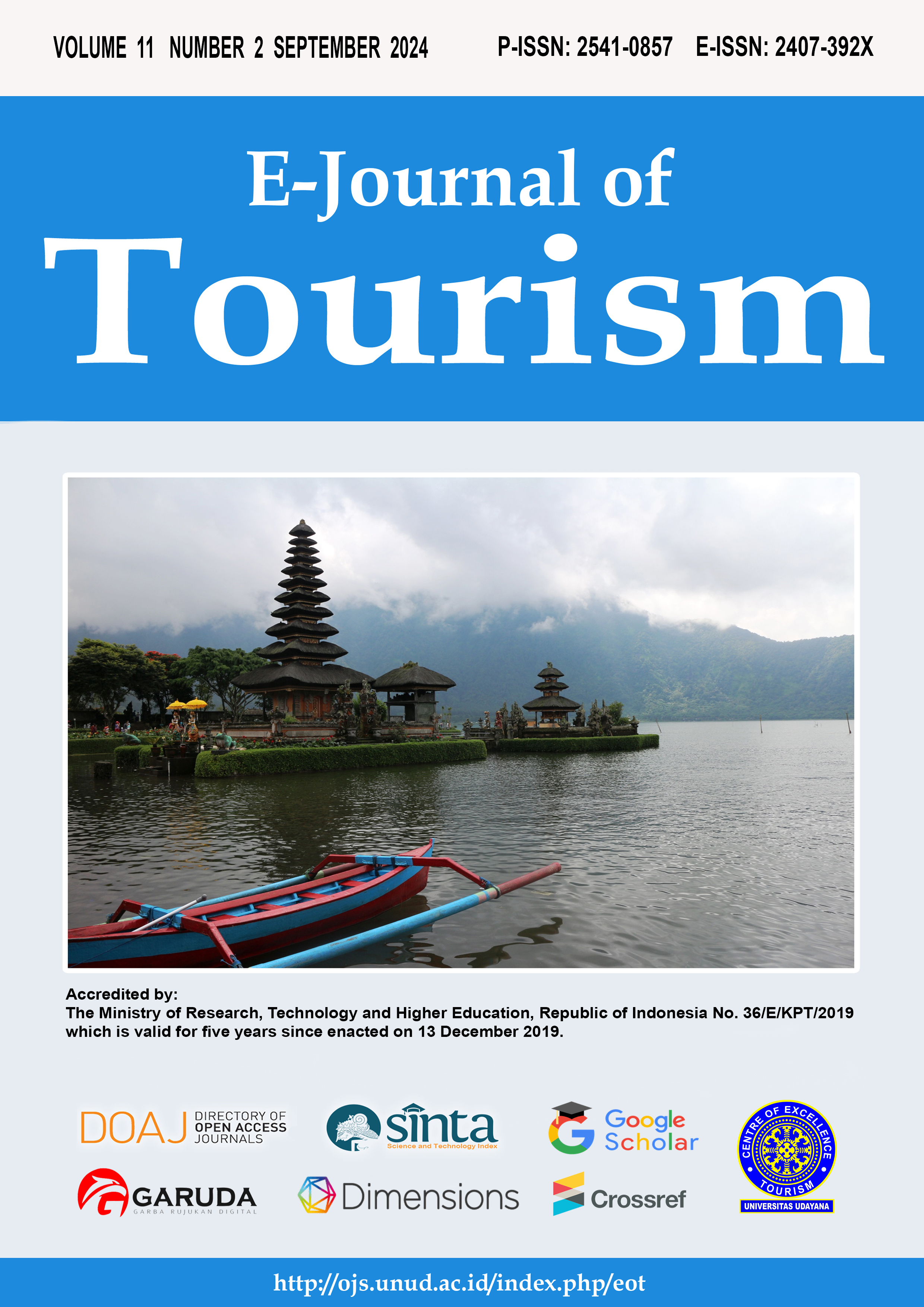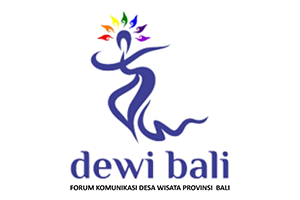Measuring Financial Well Being of Tourism Labor in Bali: A Comparative Study of Generation Z and Millennial
Abstract
Tourism in Bali is a hallmark of economic prosperity, attracting millions of tourists every year due to its natural beauty, rich cultural heritage, and preserved cultural heritage. Behind this vibrant industry are millions of labors whose livelihoods depend directly or indirectly on tourism. The research explores the financial well-being of the Millennial Generation (Generation Y) and Generation Z labors in the Bali tourism sector. This method uses a quantitative approach with crosstab analysis facilitated by SPSS Statistics 25, which was collected via questionnaires from 151 tourism labors in Bali. The main findings show that although levels of financial well-being vary between generations, most respondents said they were happy with their finances. In addition, income disparities are visible, with the higher the age of tourism labors in Bali, the higher their income. However, regarding perception, financial well-being is relative, whereas generational age does not always influence financial well-being. This research contributes to a deeper understanding of the dynamics of financial well-being among Bali tourism labors. The results of this research are expected to create strategies to increase income stability, job security, and financial literacy, which are recommended to support the tourism sector sustainably and improve the overall welfare of labors in Bali.
Downloads
References
Arber, S., Fenn, K., & Meadows, R. (2014). Subjective financial well-being, income and health inequalities in mid and later life in Britain. Social Science & Medicine, 100, 12-20.
Arfiani, D. (2020). Berantas Kemiskinan. Alprin.
Berger, Arthur Asa. Bali tourism. Routledge, 2013.
Bonke, J., & Browning, M. (2009). The distribution of financial well-being and income within the household. Review of Economics of the Household, 7, 31-42.
Brüggen, E. C., Hogreve, J., Holmlund, M., Kabadayi, S., & Löfgren, M. (2017). Financial well-being: A conceptualization and research agenda. Journal of business research, 79, 228-237.
Consumer Financial Protection Bureau. (2015). Financial well-being: The goal of financial education. New York: Consumer Financial Protection Bureau. Retrieved December 2, 2018 from https://www.consumerfinance.gov/reports/financial-well-being.
Cukier, J., & Wall, G. (1995). Tourism employment in Bali: A gender analysis. Tourism Economics, 1(4), 389-401.
Dana, N. M. S. A., & Dewi, A. S. K. (2016). Pengaruh Kompensasi Dan Dukungan Organisasi Terhadap Kinerja Karyawan Di Hotel Asana Agung Putra Bali (Doctoral dissertation, Udayana University).
Diener, E., & Seligman, M. E. (2004). Beyond money: Toward an economy of well-being. Psychological science in the public interest, 5(1), 1-31.
Dolan, P., Elliott, A., Metcalfe, R., & Vlaev, I. (2012). Influencing financial behavior: From changing minds to changing contexts. Journal of Behavioral Finance, 13(2), 126-142.
Dwyer, L. (2023). Tourism development and sustainable well-being: A Beyond GDP perspective. Journal of Sustainable Tourism, 31(10), 2399-2416.
Dziadkiewicz, A., Lindell, L., & Minga, Z. (2023). Generation Y and Z towards wellbeing tourism-challenge or necessity for the tourism industry?. Zeszyty Naukowe Politechniki Śląskiej. Organizacja i Zarządzanie, (173).
Hitchcock, M. (2023). Tourism, development and terrorism in Bali. Routledge.
Hobart, M. (1978). The path of the soul: the legitimacy of nature in Balinese conceptions of space. Natural symbols in south east Asia, 5-28.
Howlett, E., Kees, J., & Kemp, E. (2008). The role of self‐regulation, future orientation, and financial knowledge in long‐term financial decisions. Journal of Consumer Affairs, 42(2), 223-242.
Kim, J., Garman, E. T., dan Sorhaindo, B. (2003). Relationships among credit counseling clients' financial wellbeing, financial behaviors, financial stressor events, and health. Journal of Financial Counseling and planning, 14(2).
Listiani, W., Ningdyah, A. E. M., Rohaeni, A. J. (2024). Desire to Revisit: Memorable Experiences Drive Domestic Tourists to Return to Bali. Jurnal Kajian Bali (Journal of Bali Studies), 14 (1), 147-168. DOI: https://doi.org/10.24843/JKB.2024.v14.i01.p07
Lusardi, A. (2019). Financial well-being of the Millennial generation: An in-depth analysis of its drivers and implications. Global Financial Literacy Excellence Center, 1-7.
Manuaba, I. A. K. A., Sanjiwani, N. M. G., & Lestari, N. K. A. D. (2023). Gambaran Kualitas Hidup Pekerja di Sektor Pariwisata Wilayah Bali Selatan. Psikologi Prima, 6(2), 125-131.
Mardiyah¹, R. A., & Nurwati, R. N. (2020). Dampak pandemi Covid-19 terhadap peningkatan angka pengangguran di Indonesia. Jurnal Ilmu Kesejahteraan Sosial Universitas Padjajaran.
Meidiana, N. P. C. A. T., & Marhaeni, A. A. I. N. (2019). Pengaruh kepemilikan aset, ketersediaan infrastruktur, dan pendidikan terhadap pendapatan dan kesejahteraan rumah tangga miskin. Buletin Studi Ekonomi, 24(1).
Osberg, L., dan Sharpe, A. (2002). An index of economic well–being for selected OECD countries. Review of Income and Wealth, 48(3), 291-316.
Philippas, N. D., & Avdoulas, C. (2021). Financial literacy and financial well-being among generation-Z university students: Evidence from Greece. In Financial Literacy and Responsible Finance in the FinTech Era (pp. 64-85). Routledge.
Prawitz, A. D., dan Cohart, J. (2016). Financial management competency, financial resources, locus of control, and financial wellness. Journal of Financial Counseling and Planning, 27(2), 142-157. doi: 10.1891/1052-3073.27.2.142
Ratz, T., & Michalkó, G. (2011). The contribution of tourism to well-being and welfare: the case of Hungary. International Journal of Sustainable Development, 14(3-4), 332-346.
Reisenwitz, T. H., & Fowler, J. G. (2019). Information sources and the tourism decision-making process: An examination of Generation X and Generation Y consumers. Global Business Review, 20(6), 1372-1392.
Renaldo, N., Sudarno, S., & Marice, H. B. (2020). The improvement of generation z financial well-being in Pekanbaru. Jurnal Manajemen Dan Kewirausahaan, 22(2), 142-151.
RI, Undang Undang Nomor 13 Tahun 2003 Tentang Ketenagakerjaan.
Sabri, M. F., Cook, C. C., dan Gudmunson, C. G. (2012). Financial well‐being of Malaysian college students. Asian Education and Development Studies.
Sadiartha, A. A. N. G (2017). "Lembaga perkreditan desa sebagai penopang keajegan budaya ekonomi masyarakat Bali." Jurnal Kajian Bali 7.2: 1-18.
Sari, I. A. P. W. I. (2023). E-Booklet as Communication Strategy to Influence Change on Tourist’s Behaviour in Bali. Bali Tourism Journal, 7(2), 22-26.
Seligman, M. E. (2002). Authentic happiness: Using the new positive psychology to realize your potential for lasting fulfillment. New York: Atria Paperback.
Shankar, N., Vinod, S., & Kamath, R. (2022). Financial well-being–A Generation Z perspective using a Structural Equation Modeling approach. Investment Management and Financial Innovations, 19(1), 32-50.
Shankar, N., Vinod, S., & Kamath, R. (2022). Financial well-being–A Generation Z perspective using a Structural Equation Modeling approach. Investment Management and Financial Innovations, 19(1), 32-50.
Sri Mulyantini, M. M., & Dewi Indriasih, M. M. (2021). Cerdas memahami dan mengelola keuangan bagi masyarakat di era informasi digital. Scopindo Media Pustaka.
Suardana, K. D. (2014). Real Bali: Temples, Palaces, Museums and Nature. PT. Phoenix Communications.
Suasih, N. N. R., Setyari, N. P. W., Purwanti, P. A. P., Mustika, M. D. S., Yudha, I. M. E. K., Saputra, I. M. Y., & Widiani, N. M. N. (2023). Literasi pengelolaan keuangan keluarga dengan balita dan upaya pencegahan stunting. Abdimas Dewantara, 6(2), 192-201.
Tie, S. C., & Nizam, I. (2015). Determinants of financial well-being for generation Y in Malaysia. International Journal of Accounting & Business Management, 3(2), 11-28.
Vlaev, I., & Elliott, A. (2014). Financial well-being components. Social indicators research, 118, 1103-1123.
Wijaya, P. Y., Kawiana, I. G. P., Suasthi, I. G. A., & Suasih, N. N. R. (2022). Edukasi perencanaan keuangan keluarga masyarakat adat Desa Sukawati Provinsi Bali. Jurnal Abdi Insani, 9(2), 460-470.
Xiao, J. J. (2008). Applying behavior theories to financial behavior. In Handbook of consumer finance research (pp. 69-81). New York, NY: Springer New York.
Yasa, I. M. (2008). Penanggulangan kemiskinan berbasis partisipasi masyarakat di Provinsi Bali. Input: Jurnal Ekonomi dan Sosial, 1(2), 43814

This work is licensed under a Creative Commons Attribution 4.0 International License.
The copyright of the received article shall be assigned to the journal as the publisher of the journal. The intended copyright includes the right to publish the article in various forms (including reprints). The journal maintains the publishing rights to the published articles.




















